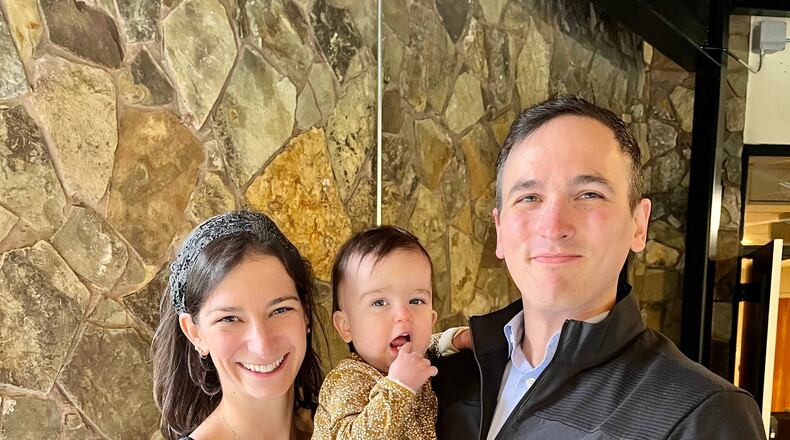Georgia parents anxiously waiting for a COVID-19 vaccine for still-vulnerable children under 5 years old will have to wait a little longer after the Food and Drug Administration delayed a decision originally expected today. The federal agency said it wanted to see more findings from clinical trials of the vaccine, causing a delay of at least two months.
“I feel like this (vaccine) is extraordinarily important for our family. When I heard the news I was definitely bummed about it, but at the same time thankful they are taking the science very seriously and that they want to do their due diligence,” said Rachael Klein Miller, mom to a 20-month-old daughter who lives in Johns Creek.
The FDA meeting, which had been planned for today, was set to decide whether children under 5 and as young as six months old should start getting two doses of Pfizer’s vaccine — a decision that would’ve been made before data on a third dose was ready.
But with Pfizer announcing two doses of the vaccine had delivered less robust antibody levels among children ages 2 through 4, the FDA said it now believes “additional information regarding the ongoing evaluation of a third dose should be considered.” The dosage of the vaccine is one-tenth of that given to those 12 and over.
A COVID-19 vaccine for younger children is considered a major step in protecting all ages against the coronavirus and taming the pandemic.
But as low vaccination rates for children ages 5 to 17 show, many parents remain hesitant about vaccinating their young children while the risk of serious illness from the coronavirus remains relatively low.
There are about 650,000 children under the age of 5 in Georgia, according to U.S. Census estimates.
Credit: Steve Schaefer
Credit: Steve Schaefer
Children ages 5 to 11, eligible for vaccines since November, have lagged the vaccination rate for older children, causing doctors and public health experts to worry there could be even more reluctance to get the shot for babies and preschoolers.
“Each time we have a different age group authorized to receive the COVID vaccine, it feels like a gift every time,” said Dr. Andi Shane, medical director of infectious disease at Children’s Healthcare of Atlanta. “But it’s not just having the vaccine but giving the vaccine.”
Vaccination rates among children 5 to 11, as measured by first doses administered daily, rose sharply for the two-week period after the recommendation was first made on November 2, but then dropped sharply. Vaccination rates remain low across the country for that age group, with only 19% of those 5 to 11 now fully vaccinated, according to a new analysis by the Kaiser Family Foundation based on federal data.
In Georgia, about 40% of ages 12 to 17 are fully vaccinated, and about 11% of ages 5 to 11, according to the Georgia Department of Public Health.
But when broken out at the county level, vaccination rates for children vary widely and are generally much higher in metro Atlanta, according to data from the Georgia Department of Public Health obtained by The Atlanta Journal-Constitution.
Fulton County had the most robust vaccination rates for the older age group and nearly the highest for the younger group: about 59% of ages 12 to 17 and 18% of ages 5 to 11 are fully vaccinated. Other metro Atlanta counties including DeKalb and Cobb are seeing similar uptakes. But county data shows that in several rural Georgia counties, including Haralson, Franklin and Appling, less than 17% of those 12 to 17 are vaccinated and less than 3% of those 5 to 11. In Appling County, only 1.6% of children 5 to 11 have been vaccinated and in Bacon County it’s under 1% for that age group.
“Those numbers for 5- to 11-year-olds are very disappointing,” said Dr. Hugo Scornik, a Conyers pediatrician who leads the Georgia chapter of the American Academy of Pediatrics. “COVID is not a benign disease in children and the COVID vaccine adds protection and it protects families and gets us quicker to getting this (pandemic) over with.”
A recent poll from the KFF found 31% of parents of children under 5 said they plan to get them vaccinated “right away” when a vaccine is authorized while 26% said they would “definitely not” get the vaccine for their children in that age range.
Public health experts say children face greater risks from COVID-19 than they do from a rare side effect of the vaccine involving myocarditis, an inflammation of the heart, reported in a small number of young adults. Studies also show young people face a greater risk of myocarditis from infection with COVID-19 itself than from the vaccine.
During the omicron surge, the number of children 17 and under with COVID-19 hospitalized in Georgia rose to 168 on Jan. 5, according to data from the U.S. Department of Health and Human Services.
About the delay, Scornik said “this is the strong vaccine regulatory system that we have in the U.S. working as it should.”
Public health officials and pediatricians have been stressing that while children are at lower risk of serious illness from COVID-19 they are not at zero risk. The omicron variant has sickened more children than at any other point in the pandemic.
“COVID is not a benign disease in children and the COVID vaccine adds protection and it protects families and gets us quicker to getting this (pandemic) over with."
Pediatric COVID-19 hospitalizations also rose to their highest levels. Children’s Healthcare of Atlanta hit pandemic records in January, with more than 100 children in beds at once for COVID-19. Shane said the vast majority of the pediatric patients hospitalized for COVID-19 are not vaccinated — either by their parent’s choice or because they are not yet eligible.
Edye Disner, director of Dunwoody Prep, said the omicron wave heavily impacted children, families and staff. She said she herself got infected despite being vaccinated, boosted and diligent about mask-wearing. As cases soared, many children caught the virus, and several children too young to be eligible for the vaccine were exposed to the virus and had to quarantine at home, causing nonstop disruptions.
“Parents have to work and support their families, pay the mortgage and there is a high level of frustration right now among parents,” she said.
The wait for a vaccine for younger children has been difficult but Disner said, “I think the science must make sure that the immunizations are able to produce the desired immune response safely. If waiting is safest, it’s what has to happen.”
Klein Miller agrees and looks forward to a vaccine that she considers “life-changing” for her family.
“We feel left behind from much of the world,” said Miller who is a rabbi. “especially living in Atlanta with people who have moved on from the pandemic even though the pandemic is not over.”
John Perry, technical director of the data journalism team contributed to this report.
Keep Reading
The Latest
Featured




